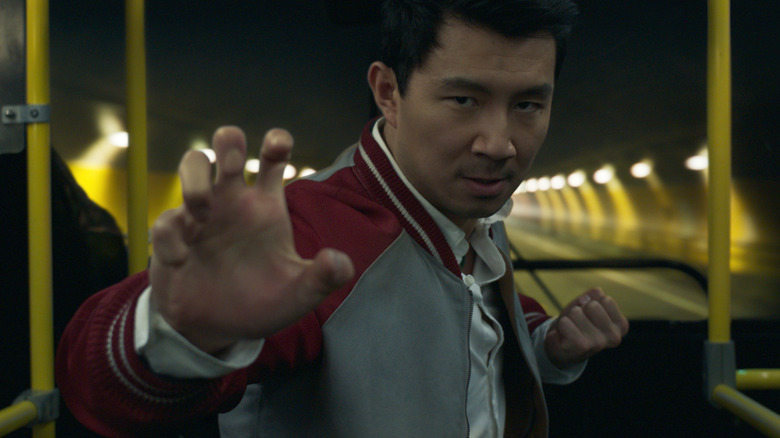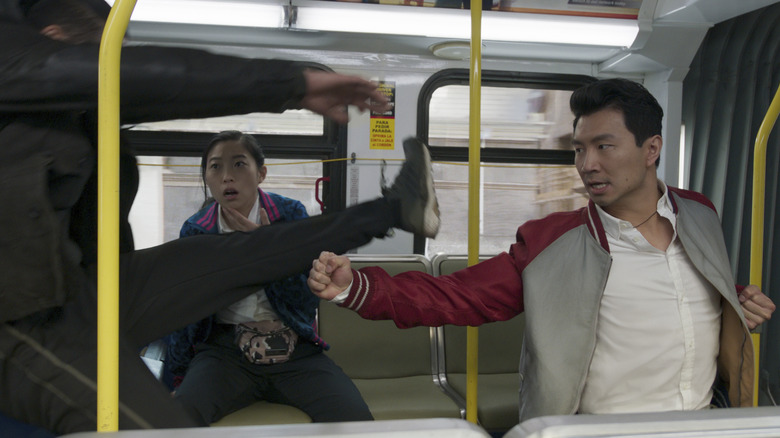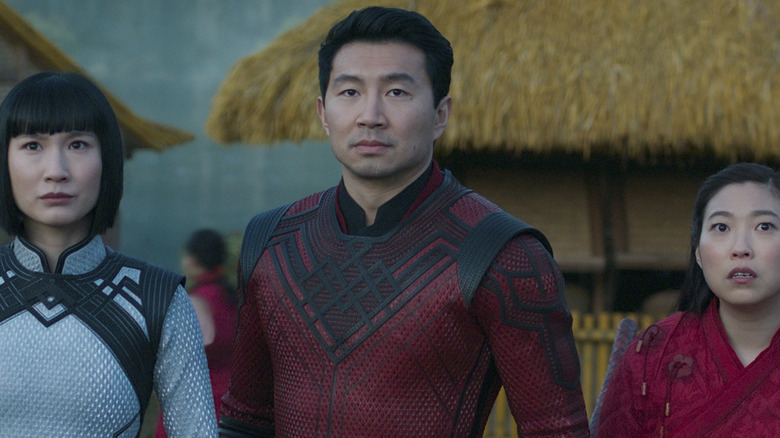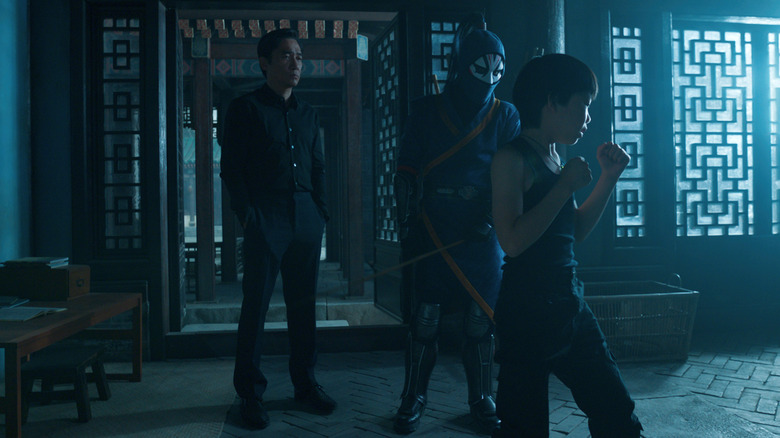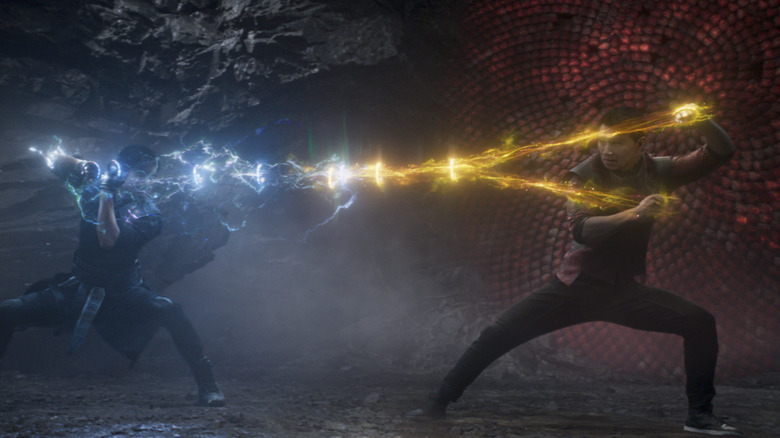Shang-Chi Spoiler Review: Marvel's Typical Third Act Problems Start At The Beginning
The release of "Shang-Chi and the Legend of the Ten Rings" gives us an opportunity to once again ask ourselves: What are we really talking about when we talk about the movies of the Marvel Cinematic Universe? It's a surprisingly fraught question, depending on who you ask. The most loyal fans will broker no arguments about the cultural cachet this franchise enjoys on a regular basis, acknowledging ceaseless social media chatter, popular character-inspired memes, and box office totals that continue to exceed expectations as proof that the franchise must be doing something right, if so many people respond to it each and every time out. Dissenters will point towards a particular flash-in-the-pan hollowness that's endemic in the overall body of work (especially compared to its predecessors) — one in which rapid-fire quips too often take the place of meaningful character-building, muddy-looking action feels thoroughly weightless and inert, and third-act conflict resolution routinely takes a backseat to spectacle and excess. It's possible for more than one of these assertions to be true at the same time.
But it's that last point that interests me the most, as this complaint has become so prevalent and widespread among certain circles that it threatens to be dismissed as a cliché turn of phrase rather than an incisive critique of a very real recurring problem. "Shang-Chi" boasts invaluable strengths, such as a compelling lead, a rich cultural well to draw upon, and some of the MCU's most genuinely hard-hitting action and choreography ... and yet, for all that, something still feels missing in the end. To figure out why the final act once again doesn't land quite as effectively as it could've been, a trip through the preceding aspects of the film is necessary.
In other words, what we'll really be talking about here is the nature of set-ups, pay-offs, establishing character motivations, and the timing of revealed information. It's more fun than it sounds, I promise.
This article covers major spoilers for "Shang-Chi and the Legend of the Ten Rings."
A Shaky Setup
For starters, let's start with, uh, the start. Writer/director Destin Daniel Cretton ("Short Term 12," "The Glass Castle," "Just Mercy") is best known for his quietly devastating character studies and dramas, which is what made his hiring so refreshing in the first place ... but also makes the opening of "Shang-Chi" stick out like a sore thumb as much as it does. Anyone who's watched more than one epic fantasy in their life will immediately recognize the well-worn ground of a table-setting prologue, narrated by an unknown speaker but who is likely (read: almost certainly) someone with close ties to our protagonist. The expo-dump gives us the backstory for Tony Leung's Xu Wenwu, a centuries-old conqueror driven by the power of the mystical Ten Rings who meets his match with Ying Li (Fala Chen) and soon puts the Rings and his warmongering days behind him to choose love instead. We soon find out that Li is the narrator passing down this oral tradition to her young son Shang-Chi (told you!) before her untimely but mysterious death, making it clear that we haven't been given the full picture just yet. Not even close. But we'll get back to that.
We jump ahead from 1996 to the present day, meeting Simu Liu as a now-grown Shang-Chi. He goes by the Americanized name of Shaun — frustratingly the film's only real attempt at commenting on a complex and relevant cultural barrier — and works a dead-end job as a valet driver with his best friend Katy (Awkwafina) in a world that seems oddly unaffected by the carnage wreaked by Thanos. In fact, the Snap Heard 'Round the World is only vaguely alluded to in throwaway dialogue and everyone seems to have adjusted extraordinarily well, making it hard to decide whether it's more distracting to ignore, directly address, or sort of half-heartedly nod towards the ongoing world-altering events of the overall MCU the way that "Shang-Chi" does.
The exciting fight scene taking place on an out-of-control San Francisco bus is the first moment that "Shang-Chi" throws down the gauntlet and announces itself with a flourish, but it's also where the first of several early missteps occur. The hand-to-hand brawl where Shang-Chi initially lets loose his powers against the Ten Rings foot soldiers is as kinetic and thrilling as any action sequence the MCU has produced to this point, helped immeasurably by cinematographer Bill Pope's ("The Matrix" trilogy, "Spider-Man 2," "Scott Pilgrim vs. the World") close-in camerawork that offsets the otherwise bland setting of nondescript city streets. But there's also the mildly confusing aspect of how Liu plays this scene as if he were discovering his superheroic abilities for the very first time along with Katy and the audience, which feels contradicted when we later learn that he was simply hiding them all along. Just a hint of foreshadowing and prior set-up was probably needed here to help make the action itself, as well as the subsequent rapid-fire flashback showing his intense training as a child, feel less out-of-nowhere.
Murky Motivations
However, the real problem comes when the one-armed warrior named Razor Fist (Florian Munteanu) is finally dispatched, though not before snarling that Shang-Chi and his sister "deserve" what's coming to them. To Shang-Chi, this ominous warning can only mean that his father Wenwu has returned to settle a score between them, re-establishing our post-prologue perception of the character as an antagonistic one.
A mysterious postcard bearing a dragon symbol and a Macau address then leads Katy and Shang-Chi to search for his estranged sister before his father can get to her first. Oh that's right, he has a sister now (Xialing, played remarkably well by first-timer Meng'er Zhang). This information also could've been established at any point during that prologue, but it's inexplicably withheld from us until now as a rushed reveal that lands without any actual substance. Another tense and effective action sequence on precarious scaffolding culminates with the two siblings entirely at the mercy of their Ten Rings-wielding father ... who then promptly admits that he never expected his minions to kill or even pose much of a challenge to Shang-Chi in the first place. Then why send them at all, you ask? Beats me. And wait a second: If Xialing never sent that postcard, as she informs her brother, then why would Wenwu go to all the trouble of sending it to Shang-Chi to lay a trap for them when he apparently already knew where both his children were?
Logic-based nitpicks aside, this sudden about-face on Wenwu's part proves far more troublesome, as it only further muddies up his relationship towards his estranged children — which is ostensibly the backbone of the entire film. Much of the remaining second act eases off the gas pedal to set the stage for an all-out battle that will bring an end to the conflict (one way or another). Unfortunately, the cumulative effect of the disjointed flashbacks filling in crucial backstory in drips and drabs, as well as Wenwu's haphazard character motivations, combine to sabotage the final stages of "Shang-Chi" before it has even begun.
Wenwu initially wants to bring Shang-Chi and Xialing home so they can help him find his long-lost love Li, whom he mistakenly believes is alive and being held prisoner in her homeland of Ta-Lo. But barely a few scenes later, Wenwu is locking up his children in a cell without a second's hesitation for speaking out against him (very mildly, at that) and is now fully prepared to "rescue" Li without their help at all. Despite being given the most potent backstory and by far the most full-fledged arc in the entire film, his motivations regarding his children seem to change entirely based on the scene and the needs of the script. In this instance: The script needs the siblings to find Trevor Slattery (a most welcome return of Sir Ben Kingsley in all his glory) and his adorable MacGuffin-y sidekick Morris, find a car they can use to navigate the hidden entrance to Ta-Lo, and pledge themselves to the Ta-Lo natives and their aunt Ying Nan (a tragically wasted Michelle Yeoh) against Wenwu and the Ten Rings' invading forces. All of this comes at the cost of any clarity or consistency with Wenwu and any meaningful interiority with Shang-Chi himself.
Frustrating Flashbacks
On that note, consider how Shang-Chi doesn't appear to be struggling with any sort of emotional, inner conflict at all throughout most of the movie ... other than some tacked-on lip service about him remaining in hiding most of his life and needing to come out from the shadows. But there's a crucial difference in someone stubbornly making active choices as part of their character flaws versus a script forcing a main lead to remain passive as a matter of mere circumstance.
No, "Shang-Chi" waits for an out-of-nowhere moment of self-doubt on the eve of battle, where he vows to kill his father despite that never really being something he struggled with previously. Not only does this abrupt character turn and its accompanying flashback about blood debts come shockingly late in the game (again, why not switch up the order of revealed information and make this an issue that Shang-Chi wrestles over from the beginning?), but it only reappears again during a stray moment in their one-on-one fight where Shang-Chi has disarmed him and could easily kill him. He doesn't, of course, but why would he ever do so in the first place? Based on the information give to us, he only just started having those thoughts roughly 10-15 minutes earlier in the runtime, and has just as quickly changed his mind again. This isn't a valuable learning moment; it's the illusion of one.
For the most part, this flashback structure hurts far more than it helps, even going back to the prologue itself. There, the film dances around why exactly Li is dead or what the circumstances were. It takes well over an hour later for us to finally find out that she was killed as retribution for Wenwu's previous sins and that a young Shang-Chi witnessed all this from a window. It takes yet another flashback to show us Wenwu's too-late arrival onto the scene and, rather than convey this through the actual scene, he simply recounts to Shang-Chi at a later moment that he's blamed his son all along for failing to avert Li's death. Rather than this moment packing an emotional punch and instantly clarifying decades of fraught father/son relationship issues, my only reaction was, "Wait, what? Why wasn't any of this established beforehand?" This approach would've allowed the rest of the film to actually delve into these understandably human complexities and nuances, adding far more meaning to those brutal sequences of a young Shang-Chi being mercilessly put through all sorts of martial arts training, but we're robbed of this for the sake of a series of reveals with increasingly diminishing returns.
(Not) Like Father and Son
By the time we get to the third act proper, the damage has already been done. Many of those aforementioned Marvel problems rise to the fore once more, but even being offset by unique-looking fantastical imagery and the superficially compelling final duel between father and son can't save it. Instead, we're left with a mixed bag of very apparent potential, anchored by a shockingly two-dimensional Shang-Chi who barely even seems to register the death of his father or has shown any true growth over the course of his adventures. It's somewhat fitting, then, that the film rushes towards two post-credits scenes that serve as setup for future movies.
All things considered, "Shang-Chi" could still be considered a passable movie; even a good one. But ultimately, setting up and paying off what's to come continues to take precedence over the here and now.
